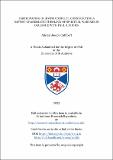Participating in divine conflict : constructing a Baptist-charismatic theology of spiritual warfare in dialogue with Paul S. Fiddes
Abstract
In light of the lack of systematic theology work on the demonic-spiritual realm, the aim of this thesis is to construct a doctrine of God which is commodious and coherent enough to locate a theology of spiritual warfare. The specific question that guides the thesis is ‘does the contemporary theology of Paul S. Fiddes offer a better framework than traditional theologies to explain the nature and character of God that best fits with a theology of spiritual warfare?’ Indeed, the reached answer concludes that at variance with traditional doctrines of God, a critical evaluation and reconstruction of Paul Fiddes’ theology – with emphases on God’s kenotic sovereignty, passibility, openness to the created order and panentheistic reality – offers a better structure to construct a Doctrine of God that best imbibes a theology of spiritual warfare.
In order to address and answer the question, the development of the thesis has three distinct phases. First, after the introduction, chapters two and three broadly delineate with some analysis Fiddes’ doctrine of God and his understanding of the demonic realm and nature of evil. From this follows, in chapters four to six, critical examinations of the three incommunicable attributes of God, - divine omniscience, omnipotence, omnipresence - which are explicated using Fiddes’ corpus as well as salient interlocutors. These chosen attributes are central to a doctrine of God that helps make sense of the spiritual world, especially the demonic, as attested to by scripture, reason and experience. Finally, in chapter seven, the overall findings of these five chapters are then used to build a constructive theology of spiritual warfare, a dialectical theology operant on the planes of the individual and corporate which is theologically congruent with the critically adapted doctrine of God presented in the previous chapters. The entire thesis takes the form of a dialogue between Fiddes and this author, who continually draws upon pertinent modern (and some historical) scholarship concerning divine conflict and the doctrine of God.
Type
Thesis, PhD Doctor of Philosophy
Collections
Items in the St Andrews Research Repository are protected by copyright, with all rights reserved, unless otherwise indicated.

